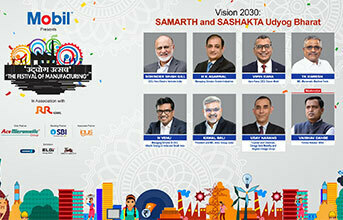
Given, the output quality is still questionable, he stressed developing a culture of quality over quantity. "Be it quality of education in the school or colleges or quality of training in the industry," Agarwal said, "the basis of everything should be on developing a culture of excellence and quality."
N Venu, Managing Director & CEO of Hitachi Energy in India and South Asia cited an interesting data on global output. According to him, India's manufacturing output today accounts for around 3.1 per cent of global output. The manufacturing output of the two biggest countries, China & the USA, account for 29 per cent and 16 per cent respectively.
Commenting on the data, Venu said, "If you see, 50 per cent of the manufacturing outputs lie with these two countries (China & USA). Today, we are at 3.1 per cent, so what we need as a country is not incremental growth. We need to leapfrog to reach what we have envisaged becoming. And this can happen if we work towards end-to-end, innovation-led and technology-led manufacturing, not only for the large-scale organization but the whole value chain, such as small and medium enterprises."
He also highlighted that India should focus on increasing the amount they spend on innovation. Citing data from U.S. private Industries, N Venu highlighted that the USA spent close to nine per cent of its sales on their in-house R&D. On the other hand, Germany spends close to four per cent, whereas China spends nearly two and a half per cent. However, India spent almost 0.3 per cent. Given the gap, N Venu stated, "If there is no innovation, then we will not be able to manufacture. Currently, what we are doing is more offshoring. However, we need to practice more innovation-led manufacturing growth."
TK Ramesh, MD, Micromatic Machine Tools questioned, "Can we be Samarth and Sashakta? "I don't see any reason why we can't. Do we have a choice not to become? I don't believe we have a choice." However, an optimistic Ramesh stated that this discussion on building a Samarth and Sashakt Udyog Bharat is in itself a fact that a step has already been taken in this direction. "A lot of work is happening on that front, and the best part is that several Indian companies have been doing a lot of work. Even a lot of multinationals are coming here. We have been making in India for India, and I believe we will Make in India for the world," said TK Ramesh.
According to Uday Narang, Founder and Chairman, Omega Seiki Mobility and Anglian Omega Group, the young generations and Nari Shakti (women counterparts) are the ones who are going to lead this country. He further stated that not everybody needs to have a Master's or Undergraduate degree, the only thing that is needed is full-fledged technical and internship programs to help people learn. He also mentioned that we (Indians) should stop comparing ourselves to the United States or Europe, as there's no comparison between what they're doing and what we are doing. "But what we need to do is build the ecosystem. We can't compete with China or Japan or Korea unless we build the ecosystem, and this needs an alliance-based business," he added.
Talking about alliance-based business, Narang said, "I see a lot of players here doing alignment where you can have MSME, bigger organizations and public-private partnerships. Even at Omega Seiki Mobility, we have built alliances over the years and everything we have made in India. There is no problem having an alliance with Europe, Japan, Korea or wherever, but one should ensure to make and build the ecosystem here in India."


























